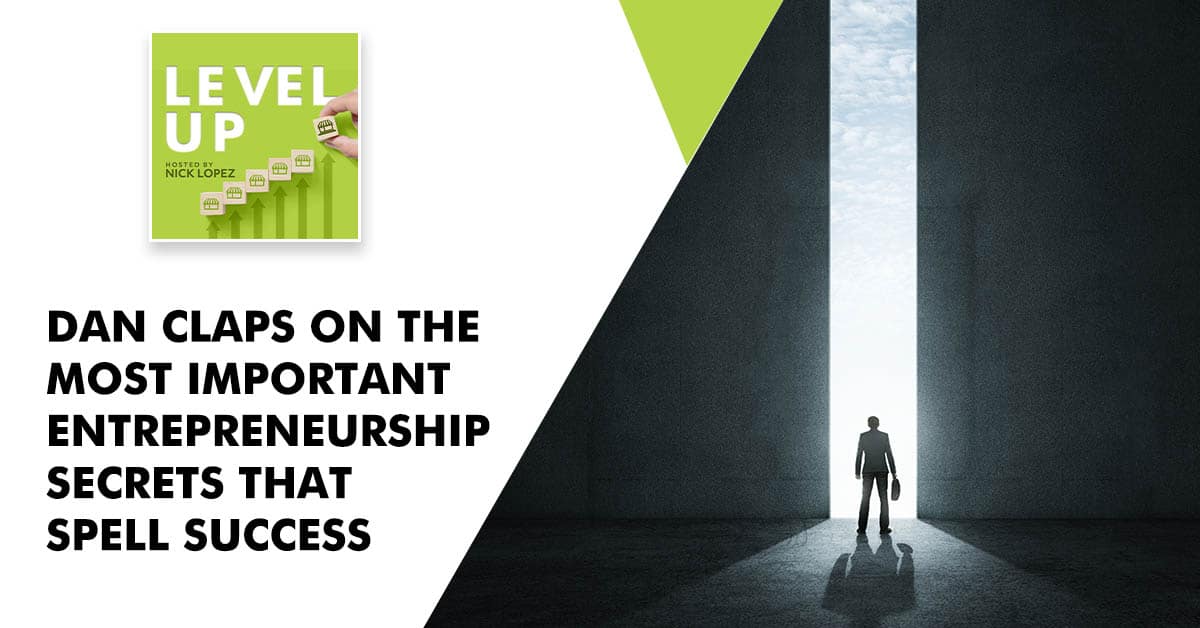
This episode of The Level Up Show features Dan Claps, who has undoubtedly become an authority in the realm of franchising. With a burning passion for sharing his extensive knowledge with others, Dan is committed to helping consultants establish flourishing businesses.
Dan opens up about his personal journey, shedding light on how he became an esteemed figure in this niche industry. He provides insights into his illustrious career with IFPG, sharing memorable anecdotes and valuable lessons learned along the way.
The episode also features Dan divulging tips and tricks that guarantee a thriving consultant business. Listeners can expect to gain exclusive access to Dan’s comprehensive Franchise Playbook, a foolproof guide designed to empower aspiring entrepreneurs. Furthermore, he gives an intimate glimpse into what it truly feels like to be in startup mode, discussing the challenges and triumphs that come hand in hand with building a business from the ground up.
—
In this episode, we have an incredible entrepreneur on the show who’s a very special lead generator and franchise consultant who has helped so many people realize their dreams through franchising. He also routinely co-hosts a show called The Franchise Founders and is the Founder of a company called Franchise Playbook. Dan Claps, welcome to the show.
It’s good to see you. Thank you for having me.
Let’s get things kicked off. Franchising is a very interesting space, and so many people get into franchising and have incredible stories of how they got into the space, but it seems like nobody raises their hand and says, “I’m going to get into franchising.” There’s this term or statement, “How did franchising find you?” I’m going to pose that question to you.
It’s interesting since it’s such a specific niche. I got into this industry in 2014, so it’s been a decent amount of time and my family still doesn’t understand what I do for a living. It’s not the traditional industry that we all think of. You are right. I didn’t set out to be in franchising. I got into franchising because I had a business in college that was in the event staffing space and it was my first go at getting into business for myself.
It was more of a job than it was a business. It was all me. I was the main person for the events, the customers, and the employees. I joked that I couldn’t get sick. I worked every weekend. Think about college at the age you are, I still worked every weekend for one year straight because that was what it took to get some traction.
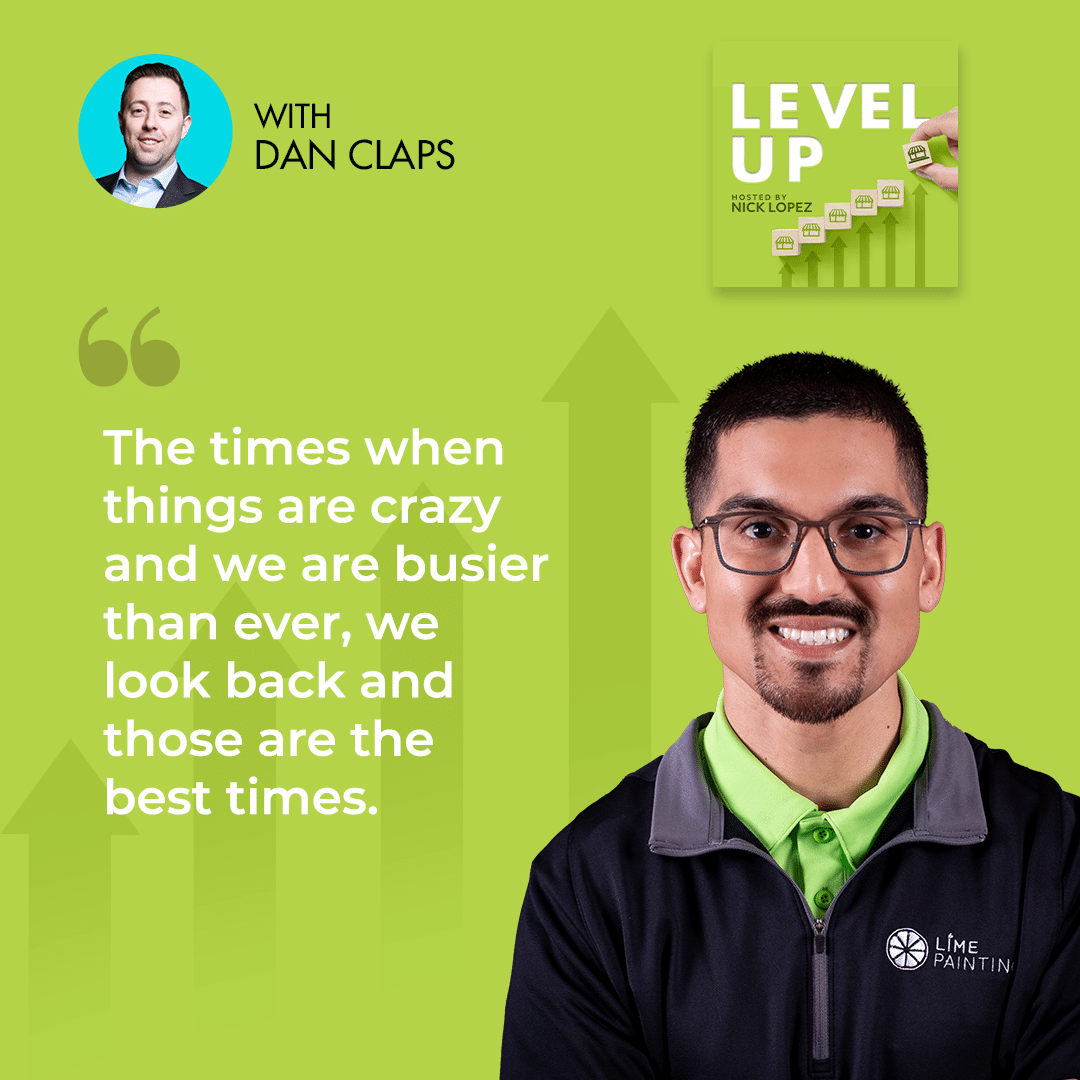
In my early twenties, I didn’t want to do that business anymore. I looked at selling it and learned that it was not only not sellable, but I’d have to probably pay someone to take the business and not even get sold. I learned a lot from that because I had no systems in my business. I started looking into franchises because they were all systems and I figured I could learn how to be a better business owner through franchising.
Through the process of exploring franchises, I was overwhelmed. There were so many options. You go on the internet, there are so many people trying to present to you options. I only had a limited amount of capital. I was looking into franchising and I fell in love with that process. In 2014, I became a business broker with Murphy Business & Financial which is a franchise to teach you how to sell businesses and franchises.
It was more focused on business resales or selling an existing business. I somehow became the franchise resale guy in New Jersey. I was very good at that. Through Murphy & Business Financial Franchise System at the time, you had a membership to the IFPG, the International Franchise Professionals Group. I learned how to sell franchises, become a franchise coach, broker, consultant, or whatever you want to call it and the rest is history. From there, franchising has become my home and will continue to be.
You didn’t necessarily pick franchising, or did you?
I wouldn’t say I picked franchising. I was looking at owning a franchise, and I never envisioned myself to be a supplier or an industry professional within franchising. I thought I would be a franchise owner, not find this whole other niche of franchise development and lead generation. I started as a business broker and franchise coach.
In 2016, the founder of IFPG and I ended up partnering and starting a lead generation company called Career Transition Leads. That changed the direction of my career because I went from franchise development or franchise brokering to lead generation for other franchise brokers and consultants. I learned the value of lead generation.
It’s an art and a talent in itself. The IFPG is an incredible organization. That’s neat that you got your introduction to them the way that you did and started off looking into franchise ownership and found this world on the other side of the fence helping people realize their dreams versus you finding one particular franchise business. Also, that segued into you being a pretty important part of IFPG and where they are at now.
I have always admired your passion for franchising and helping people realize their dreams. I appreciate you sharing how you got involved with IFPG, but you said something pretty interesting. You said that you helped a lot of the consultants find potential franchise owners through Career Transition Leads which works with IFPG, which is a franchise consulting network that helps people sort through franchises.
This is something that you are incredibly talented at. For our readers, we are trying to help them level up. This is a space that you are all too familiar with, and I feel like so many people struggle and don’t know where to even get started with lead generation. Would you share some tips and tricks for the viewers on how to generate leads and what that means? How do you do it?
Just to be clear. Lead generation is very specific to each industry. Lead generation for our franchise consultants is going to be inherently different than for franchisees, but the core principles are the same. The core fundamentals, just like running a business, lead generation has some similarities. Career Transition Leads is a platform that’s built to help IFPG consultants increase their business. It’s like in your business, you have got your lead generation systems to get your salespeople at their door painting their homes.
With lead generation, what I have learned is the three core principles that you need to stick to. Number one, before we even start doing lead gen, identify your numbers. Identify whatever business you are in. What is your average revenue per deal, per job, service, or ticket? What is your profitability on that ticket? Take the numbers. Go all the way back and reverse engineer. If your average job is X number of dollars and your profit is Y, do you know how much money you can allocate toward acquiring a new customer?
You want to create KPIs, Key Performance Indicators, where you know from your costs of, “This is the absolute aggregate cost to get someone in to buy my service. This is the cost to get someone to be presented with my service. This is the cost of a lead to talk to someone. This is what it costs per lead.” You want to break down the cost of every single step in your sales process. That way you can identify what you can allocate toward lead gen.
If your goal is to do a certain amount of revenue, you can back out how much your average job is, and then you could figure out your average cost per job. All the way down to the funnel, you could figure out how many leads you need per day, per week, or month for your sales team to accomplish their goals. The number one principle is to identify your KPIs or your costs per each area of your sales process. Principle number two would be, once you have identified that, set up a reporting tool, and a lot of franchisors have it, but all those steps have to be reported. You have to be checking in on it every day.
The number three principle is you have to understand that leads are leads. Whether you are in a high-ticket sale or a lower-end purchase price, you need to have a volume of leads coming in a predictable way. I see so many business owners get some leads here and there. They turn it off or they don’t have an automated way of getting leads. You need to set up a system that you know works that’s consistent and that’s predictable, and understand that it’s a volume game.
In whatever business you are in, you need to have a funnel of leads coming in. The bonus principle number four is just like you set up a lead generation machine that’s automated and bringing leads into your funnel, you need to set up a funnel that’s also automated. It means, “I know when a lead comes into my new company, they are texted immediately. They are emailed immediately. They are called within 40 seconds.” This is the script that is followed. This is the next step. Everything is streamlined or consistent and that’s going to allow you to be able to have some predictability as to what your lead generation efforts are doing to what it’s going to result in revenue for your business.
I love that you added that fourth. You do all this work. You leave it open to chance without that fourth. It’s like the Holy Grail there. You talked about KPIs. That speed to lead. I assume it’s something that you have up on the board and are dialed in around. What are some tips and tricks to that funnel that you mentioned? What are some pitfalls?
The first thing I would say with the funnel that I’m referring to, you can break down your funnel into little silos or little chambers where they are separated. You can then pick apart each chamber to find inefficiency. In my business, in franchise coaching, we have got the lead generation chamber. There are all the different variables in that. You have also got another section, which is the funnel itself, texting, emailing, calling right away, what’s working, or what’s not. Are we calling fast enough? Are our salespeople sticking to the script? Do they sound the right way on the phone? There are all these little nuanced areas that can get fixed in that chamber.
The next chamber is the salesperson. In our example, the franchise coach is working with the candidate. Again, are they calling on time? Are they getting on Zoom? Are they listening more than talking? Are they presenting the right franchise brands to the right candidates and then the franchise brands that they have to present?
Again, in our business, you have got these chambers and you can separate them to make it a little bit less overwhelming, but then you need to essentially audit every single step of your funnel constantly. I will give you an example. In my previous business, which was Career Transition Leads I sold my interest in. It continued to run and do great, but I had exited.

In that previous business, I didn’t know these principles. We’d have an area of the funnel broken, and we’d see our sales dip or increase and not know why. When the sales dipped, sometimes we would take weeks if not months to find the issue. Whereas if you break it into chambers and you are constantly checking each area, you are going to have better success at finding either what’s working or what’s not.
What an incredible tip. Getting granular isn’t so broad and that can separate those margins there. I assume there are probably KPIs for each one of those micro funnels. I could imagine that’s an incredible amount of support that you are providing. Thanks for those tips and tricks. I’m sure that our readers are leveling up. That’s the whole point, but I want to transition here. You are in a space that is pretty unique and I’m curious, you have mentioned a few different terms like franchise consultant, franchise broker, and franchise coach. What is the term that you like?
They are all interchangeable. My opinion on this is probably not the common opinion, but to me, a franchise consultant is a great term. You are consulting people on franchises. It makes sense to me. A franchise broker, I don’t think is necessarily negative either. There’s no reason to hide from the idea of what is a broker, by definition. It’s someone if you are brokering a service, you are putting two people together or companies together, and you are receiving a fee when a transaction takes place in the sense of a broker.
A franchise broker, there’s no reason to hide from that. I will tell anyone that I work with who is buying a franchise, “We get paid if you buy a franchise via a commission out of the franchise fee,” and it’s a significant percentage of it. It doesn’t cost you any more or less. You can’t get a discount going without a broker but the franchise company is willing to pay us that fee to find talented people that can be top producers within the system. It’s like an executive recruiter.
My new recruiting company is to find people and the fee to pay them is well worth it because it’s finding me talent. To me, there’s nothing wrong with a franchise broker as a term, franchise consultant, or franchise coach. I have chosen to use franchise coach because our company’s Franchise Playbook plays into the branding that we have developed but all of those terms are interchangeable. They are all the same thing.
What makes a successful coach franchise coach?
I have had the privilege of getting to speak with hundreds of franchise consultants over the years, and I enjoyed learning. Every single call, I learn something from someone because there are different ways to do franchise coaching or consulting. It comes down to a few elements. One is true al altruism. They have the ability to put the person first before themselves.
They have the ability to put their candidate’s needs before themselves and to hold themselves to the highest standard that they need to make sure that their client is successful. That is not just about selling franchises. That’s number one that I have seen with great consultants that last. They have always done the right thing and that’s why they are in it.
You take like a Patrick Elsner. You don’t get there by not putting people first. Number one, I would say is always putting your candidates or your clients first. Number two, I would also say the ability to invest in leads, whether it’s with Career Transition Leads or other companies or you are doing it yourself. You need to invest in lead generation heavily.
If it’s not investing in lead generation, then you need to network heavily. In my opinion, it takes longer. You need to do both but in the beginning, you need to invest in lead generation of some sort somewhere, and consultants that have the ability to stomach that investment to get to a placement and do the best.
I would say number three is back to what I mentioned, which is with any business, it’s the same thing but they create a process. It’s predictable and it’s consistent. They don’t change it. Their best coaches are getting on the phone. They are doing a process. They are sending their client a CQ. They are taking them through a specific process, and they don’t diverge too much from that process that they know works. There are some changes. The people you work with are not computers. They have different buying styles, but more likely than not, if you set a specific process in your coaching or brokering business, then you are going to do better.
I have seen all of those things ring true around you. A true commitment to the franchise candidate and what’s best for them. You are a master of lead gen in any business. If you are looking to be successful, you have to grow the pipeline and it starts with potential customers. I’m sure having the right potential customers, that’s at heart and nuanced in itself, but then on the backend, a systematized process that provides consistency around educating somebody about so many different options in franchising.
Also, that art of matchmaking. I appreciate how you have gone about that, but I want to transition again. We have talked about the Franchise Playbook, but it’s so exciting. You are in startup mode and that doesn’t always happen. It’s a season and time of a business, but it’s a unique one. I wanted to hear from you, what is it like being in startup mode with Franchise Playbook?
It’s the most interesting, exciting, and I’d argue, the happiest time of my life right now. I saw someone speak. I can’t give credit to who it was, but they were saying that when you were in the trenches, whether it’s when you started the business and you were working seven days a week, or you just had your children, you are changing diapers and you are running around. The times when things are crazy and you are busier than ever, we look back and they are the best times. “Do you remember college? I was studying for the finals.”
Also, people in the military, think back to the times in training camp or if they were deployed. The hardest times, sometimes are the best times. I have been taking that approach since day one. I knew that this wasn’t going to be easy and that I should enjoy it because I would never be 30 years old building a new business again.
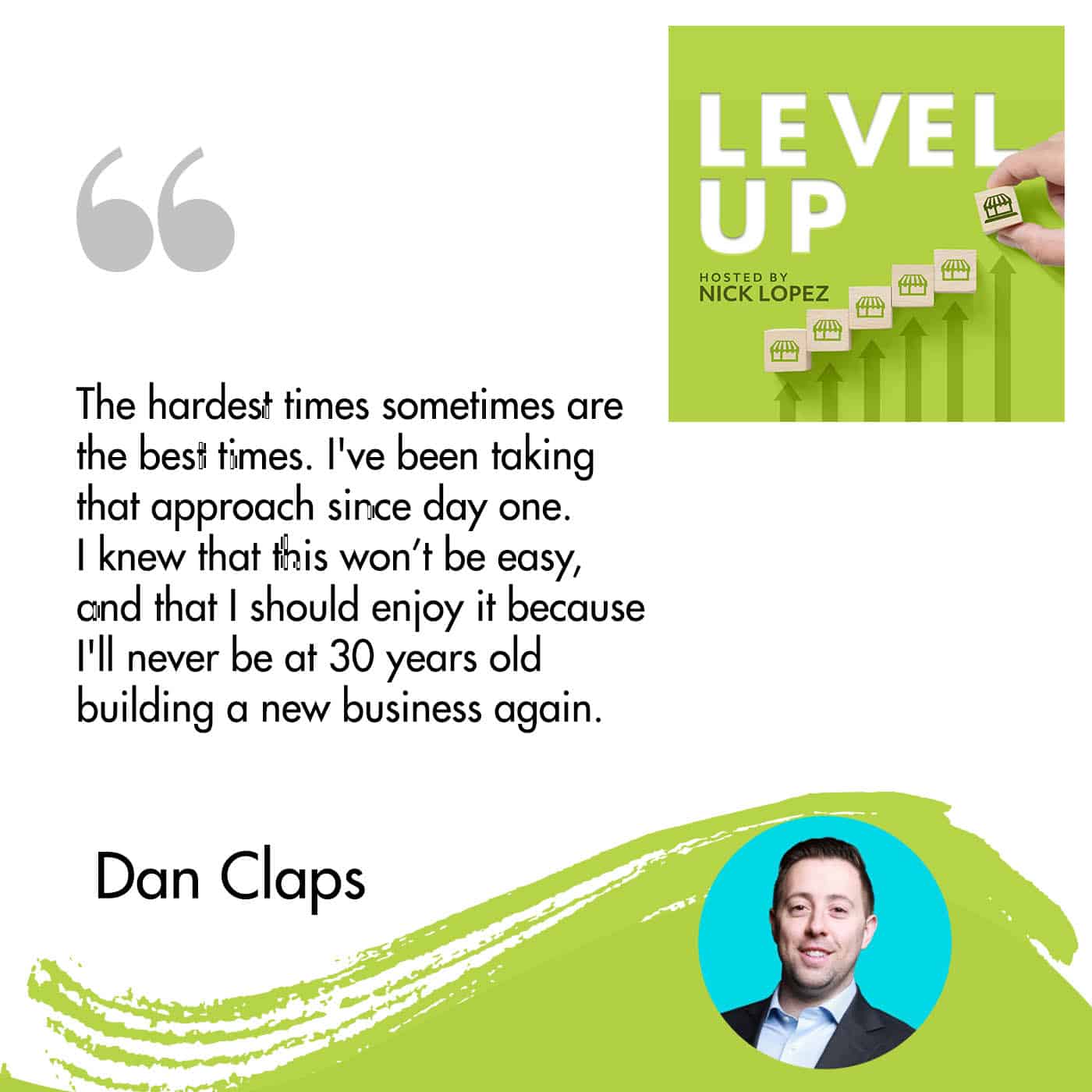
The challenge for me was I exited Career Transition Leads in May of 2022, when Princeton Equity Group made the investment into IFPG, which is an incredible opportunity for both companies, IFPG and Career Transition Leads. I knew that it was time to start my next business. I had to make sure that I was starting a business that was in line with not competing with my previous business. I wanted to stay in franchising. I wanted to start another franchise-related business, but I needed to make sure that I was respecting my previous business and the new investor and ownership.
I took a lot of time planning this business months before my departure, and then also, during the time I was transitioning, I spent nights and weekends planning and writing up the business. I don’t know if anyone has ever planned a business to the level that I did because it was a lot of planning. Franchise Playbook is what I had in mind in 2016 before starting Career Transition Leads.
I had this vision of a business. It didn’t go with that vision, and that’s what we are doing here. All of this is because I’m a franchise broker like anyone else. That’s my skillset and I have brought some other people into my team that help with that. With clients that need to have a great coach, they are part of our team and we work with them.
We are not an FSL. We are not a broker group. We are a franchise broker, but I like to say it’s a franchise broker on steroids. It means we are able to help a lot more people because we have a predictable lead generation system. Also, our franchise coaches, our W-2 employees that we are hiring from outside the industry, and never anyone in the industry. It’s a hard rule for us, but we are hiring talented people that are in other verticals. They are doing Software as a Service sales. They are selling high-end real estate.
We had someone we interviewed who sold yachts. They are a yacht broker. We are bringing them in and because of the compensation model that we are doing, we are able to attract top talent that perhaps we couldn’t have if we weren’t providing the comp structure that we are doing. It’s a riskier venture. We are taking the risk in the beginning with them, but we are providing all the processes as you do with your franchisees to then share in the success a bit more when franchise commissions come into play.
What a unique and interesting take on such a traditional form of franchising. I’m looking forward to seeing it come together and it’s been neat to see so far. If you wouldn’t mind diving into what are some of the day-to-day and the nuances of startup mode from our reader’s standpoint, I would like to get some insights from you. You are right in the middle of creating this amazing organization and clearly, you are doing something special. In startup mode around Franchise Playbook, what is that day-to-day like?
I’m in a bit of a unique scenario, only because this is a second business or a post-exit business, which if done right, it’s a little bit different in the sense that it’s capitalized a little bit differently than the first time pulling up by the bootstraps. What I would say is I’m treating this business the same. I’m pulling up by the bootstraps while also investing in infrastructure. I’m not losing the seven-day-a-week, grinding it out, doing whatever it takes attitude, but also, afraid to invest in the business and into people.
For me, the second I started building Playbook, the first step was pretending I was the head coach of a football team or the GM and I was in recruiting mode. I completely focused on putting the right team in place, org charts, and writing out the roles, and not the people. Writing out the job descriptions and the responsibilities of each role. What did I see us growing into from experience and like a madman, putting people on the team and moving them around to find them in the right seat, which is an ongoing process from Traction?
That was the first focus. It’s getting the right people in the right seats, and then building the infrastructure. I’m doing all the boring things like health insurance, 401(k) plan, standard operating procedures for every single function of our business, and building the foundation. We are implementing Traction, thanks to Nick, who’s been you are a tremendous Traction implementer and someone to look up to. We are doing all the boring stuff is the best answer. Now we are going to start focusing on revenue, but building all the boring KPIs and all those things now, we can focus on growing the business later.
It’s like that skyscraper in a skyline. You see this hole in the ground and it takes forever, and you are wondering, “What are they doing? The construction team has been there forever. They are closing down the streets and nothing is happening,” and then all of a sudden, the skyscraper goes up in no time. However, most of that was spent on the foundation.
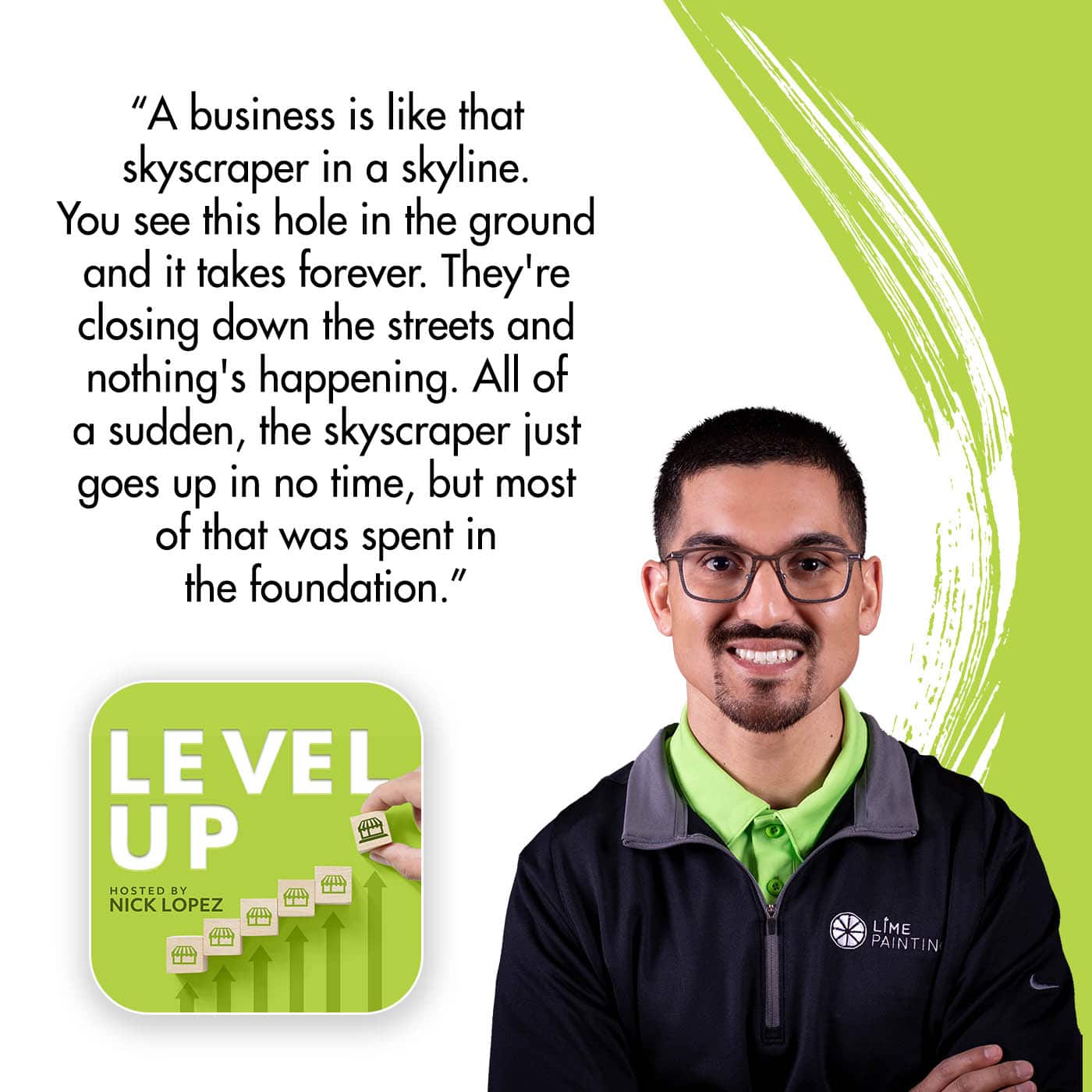
A business is so similar. I love how you said you are approaching it like a GM of a football organization. I can see the spin there with the name Franchise Playbook. You love entrepreneurship and you are in a unique position there starting up Franchise Playbook. It’s not your first venture, but you are investing and you are investing in something that doesn’t exist and that is so common in entrepreneurship.
That’s one of the most special parts of entrepreneurship if you ask me. It’s creating something from nothing and all of the mental, physical, and everything that goes into what that’s like. You can’t explain it unless you are in that position where you are investing in something and putting everything you have. You said that seven-day grind. You are doing everything you can, but that skyscraper hasn’t gone up.
You don’t see the extravagant entrance in the lobby. You don’t see it full of residents. It isn’t buzzing and humming. It’s truly a hole in the ground but that is the beauty of entrepreneurship. You will look back and this season ends. It comes and goes. Eventually, that hole in the ground is this tremendous skyscraper, and the hole in the ground is far in the rearview mirror. I’m transitioning a little bit here but in the same vein there. Why do you love entrepreneurship so much?
To piggyback on that last point you were making. It’s interesting because you said it exactly right. Entrepreneurship is building something out of nothing. It’s taking an idea that’s in your brain and putting it on paper. One of the things I learned from my transaction was I felt like the due diligence process was easy. I remember, my previous partner and I were somewhat joking, although it was emotional. There’s a lot of tension. Due diligence was not as hard as we thought it would be and that’s how I felt.
When the transaction ended and I stayed on to help with the transition for a period of time, that’s when I felt like jumping out of the window of my twentieth-story building because I learned that I did not build the foundation. We did not have a skyscraper, but we had a few-story building and the foundation wasn’t as strong as it could have been.
Everything that was in my brain, I had to get onto paper for me to be able to move on and for that business to stay intact and thrive. I learned that we had not invested in operations people. That’s not my skillset perhaps as much as much as putting in these standard operating procedures. When building a new business, your analogy was so great building that floor, that ground first and then it goes up. That’s what I wanted to do.
I love entrepreneurship for three reasons. One, you are building something out of nothing. That’s an incredible thing to look back on your life and say, “I built something out of nothing,” and it changed lives. It contributed to people’s lives. Some people were able to retire from my business with the income they made. That’s something I love.
Number two would be from a financial standpoint. Incredibly, you are in complete control of your destiny. You or I could have a tremendous year. We can have tremendous exits one day if that’s our goal. We can give the whole business away to help combat climate change like what I saw the CEO and founder of Patagonia do. It’s completely your decision. That’s number two. Number three, I would say it’s the creative side. The fact that we can create, design, change, and pivot. It’s a more exciting way of living life. Working when you love it versus not liking your work.
What we talked about is filled with risk. You are starting something and there’s potential for things to go wrong and you have so much invested. A lot of times, in a lot of situations, a startup entrepreneur is investing heavily and going out and competing in a marketplace that is heavily established. There are competitors that have been doing it for so long with so much market share and brand awareness.
Consumers don’t care. They are going to go with the best option. When you are truly a startup with no experience investing in something that doesn’t exist, that is why there are such high failure rates in your traditional startup. However, what I love and appreciate about franchising so much is that you are in business with other business owners. You are investing in a system, a process, and a winning playbook.
You have been intentional about the name of the Franchise Playbook and what you are doing. However, as a franchise owner, you are investing in this system, this winning way, and you have all the training, support, resources, and technology. Also, the marketing that you were talking about and the funnels. All of these things have been worked out. The arrows have been taken in the back by the company, the founders, and the team that exists.
All of those pitfalls have been navigated and truly turned into a business model that is turned over to a franchise owner and supported. There are all these different versions of it that provide everything that franchise ownership gives you freedom and independence. All the things that you talked about, that is franchising.
That is what you are so passionate about. That’s what I’m so passionate about. That’s what we know in the franchise space and we work so hard to improve and level up. For somebody who’s been in the space and has been very successful and is doing something pretty special with Franchise Playbook, why do you love franchising so much?
I would say that if I wasn’t starting Franchise Playbook, I would be leveraging some knowledge that I have already acquired. In my previous business, I felt like a franchisee because I had tremendous guidance in the early days on what to do, which taught me how to run a business. Franchising teaches you how to be in business. It holds you accountable. It gives you comradery. It gives you support.

The success rate is tremendously higher. You are not going into the dark. You are going into a path that’s been laid out, but you still are in control and you can still level up and have 100 units one day if your goal is that. If you stay diligent and focused, the sky is still the limit, but you have the guidance. In Franchise Playbook, our saying is, “Our clients crave freedom without the risk of going it alone.” They want to have the freedom that business ownership provides, which franchise ownership provides, without all the risks. That’s what I love about franchising.
What gets me out of bed in the morning are two things. People buying a franchise and having a life better than they had before. Also, the people on my team are doing better than they have ever done. They are making more money than they have ever made, and feeling like this company is their home. Franchising gives people freedom without the risks of going it alone.
Franchise ownership is a special thing. It provides you with everything that entrepreneurship does in a community. It’s been an honor to spend this time with you. If you have been reading this, I hope you leveled up. Thank you so much for being on the show.
Thank you so much as well. I have to compliment you. Everything you do is well done, professional, and detail-oriented. Congrats on starting this show. I’m excited to continue reading it.
If anyone is interested in learning more and getting in touch with you, how can they do that?
I would say email is the best way. My email is Dan@FranchisePlaybook.com or LinkedIn. I’m super connected on LinkedIn as well.
Thanks for that. If you have enjoyed this show, please like and also, contribute to the conversation. Let us know your thoughts about the Franchise Playbook about franchising and Dan’s incredible tips and tricks around lead generation. Please subscribe if you would like to continue to level up through information and thought leaders on the show. Hit that subscribe, like, and comment. As always, level up.
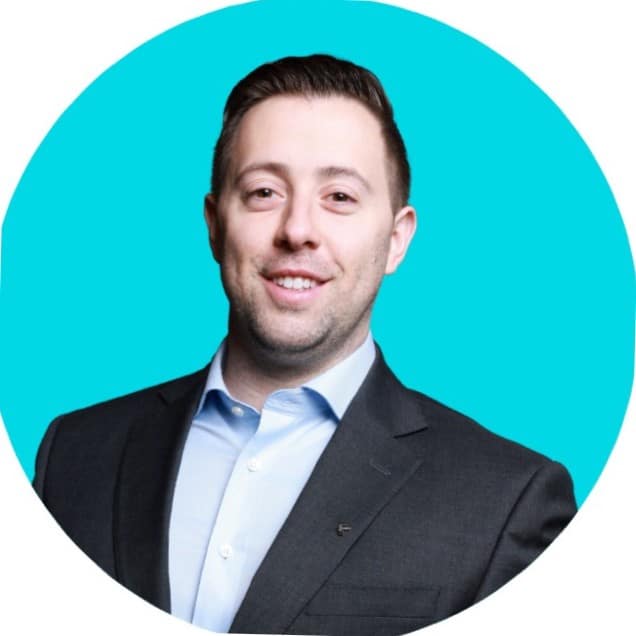
Dan Claps is a Serial Entrepreneur in the franchise space. Dan got his start in Franchising in 2014 at the age of 22 when he joined Murphy Business and Financial Corporation as the franchise system’s youngest Business Broker.
In 2016 Dan Co-Founded Career Transition Leads (CTL). A sister company to the International Franchise Professionals Group (IFPG). CTL became the leader in lead generation for Franchise Consultants with a full-time call center and over 100 contractors and employees working for the firm.
Dan went on to Co-Found Find A Business Online in 2017 as an add-on business of CTL. Find A Business Online (FABO) is an internal Franchise Brokerage Company supporting 8 full-time Franchise Brokers. During Dan’s leadership, FABO was doing as many as 12-15 placements in a month and successfully brought on 61 Ellie Mental Health territories in under one year.
In 2019 Dan and his business partner went on to Co-Found NurtureAssist. NurtureAssist is a lead generation platform for Franchisors. NurtureAssist finds franchise candidates via dialed-in lead generation practices via social media. The ads are specifically designed for each brand and are targeted to the ideal franchise buyer persona.